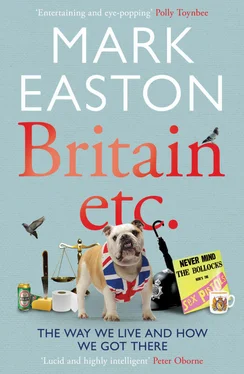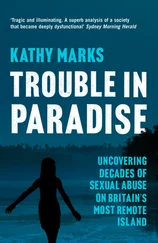The life of a dog is no longer a dog’s life: it reflects the behaviour and routine of its owner. As the nation’s waistlines have expanded, so have our pets. The doggie-snack market is currently worth more than £215 million a year. Fat people, research shows, tend to have fat dogs: a third of British pooches are now overweight, with vets warning that if trends continue, nearly half may soon be dying early because of obesity-related illness.
Overweight dogs are also more likely to sleep in their owners’ beds, a throwback to the comforter spaniels of Tudor nobility, but now regarded as a sign of dangerous anthropomorphism. We treat pets like people and deny them their animal integrity. Just as owners go on diets, so may their canine companions. There are UK slimming clubs for fat pets and weight-loss drugs specifically designed for dogs. If matters get really serious, overseas clinics encourage dog lovers to buy their porky pooch a tummy-tuck or a course of liposuction. High-street stores offer the ‘trendiest’ designer wear: sunglasses, jewellery and homeopathic remedies — all for dogs. Would our furry friend like some tree bark powder to aid digestion? Or skullcap and valerian tables ‘for symptomatic relief of anxiety, nervousness, excitability and travel sickness’?
Increasingly, owners look for human answers to the psychological problems they perceive in their pets. Your puppy is a bit boisterous; get a diagnosis for ADHD and a vet to prescribe Ritalin. Poppy has lost some of her bounce; perhaps she needs antidepressants, which, we are told, ‘can have a positive effect on dogs when used in conjunction with behaviour therapy’.
Dogs have been granted an extraordinary place in British daily life. They reflect our history, our politics and our prejudices. For those who can interpret the meanings, the breed at the end of the lead reveals something of the lifestyle, personality and temperament of the owner. To outsiders, perhaps, it is simply a pet. But not to us. Britain is fluent in dog.
It is dark and I am standing alone in the centre of London’s Olympic stadium. Suddenly, 500 huge floodlights crackle into life; 80,000 pairs of eyes turn to focus on me. With a jolt of panic, I look down and realise my dreadful error. I have forgotten to put my trousers on.
Most of us have endured this kind of anxiety dream at some point. It is the subconscious just wanting to remind us that, while we all make mistakes, it is really far better to make them in the privacy of our bedroom than in the middle of a packed sports arena, where every member of the crowd has a pair of powerful binoculars trained on one’s underpants.
The information age, however, means that these days such nightmares can easily become reality. Our failures, faults and foolishness may leak from the narrow confines of personal life into a public arena where, in Britain particularly, the lights are brighter and the eyes more numerous than any physical amphitheatre. We are all a misjudged mouse-click away from email embarrassment, a digital movie clip away from national humiliation, an injudicious tweet away from international ignominy. These are small (if nightmarish) risks for people whose lives are essentially private, but for anyone who flirts with fame or has a role on the public stage, error can be terminal.
Albert Einstein once said, ‘The only sure way to avoid making mistakes is to have no new ideas.’ There are dozens of business and lifestyle books informing readers how failure is the route to success, how progress is built upon trial and error. Military training is designed to take soldiers to breaking point, to force them to stumble. Major General Patrick Cordingley, commander of the Desert Rats during the first Gulf War, noted how senior army instructors ‘were more interested in our failures than in our successes, because they felt that everyone learnt something from an error’.
To err is human; to forgive, divine, suggested Alexander Pope. But we live in a secular society where to err is to risk public damnation and forgiveness is in very short supply. The arc lights of the media shine day and night; the protective varnish of deference has been removed; mistrust and contempt abound. One misjudgement, one moment of carelessness, can quite suddenly become a calamity. The recent scandal over illegal and immoral methods employed by Fleet Street reporters prompted national soul-searching about the dark arts of British journalism. But it also posed questions about the hostility of our public sphere, a brutal environment that has disfigured our politics and our way of life. The wealthy, the famous and the powerful have become preoccupied with risk management.
Over recent years, tens of thousands of advisors, officials and consultants have been recruited to maintain the defences against public gaffe or blunder. In Westminster, spin doctors and crisis managers are now vital cogs in the political machine, charged with shaping narrative and limiting damage. The media, meanwhile, sees its role as trying to breach the barricades, to expose every flaw and transgression. It is a constant tension that soaks up the energy of government and media alike.
Both sides claim the moral high ground: the press lobby argues that exposing the frailties of the body politic is vital for a healthy democracy; Parliamentarians maintain that effective administration is impossible in the full glare of publicity. Ministers must be able to learn from their mistakes or else they will adopt a safety-first principle that militates against innovation and change, Whitehall argues. The powerful must be held to account or canker and complacency will develop, journalists respond.
So the executive has put greater store on hiding errors and spreading blame, in the ‘national interest’. Meanwhile, the media applies ever greater effort to exposing and apportioning fault, in the ‘public interest’.
In such an environment, the stakes can rise fast. When a mistake comes to light, it may well dominate the national conversation for days or weeks. Promising political careers can be reduced to ash in the media firestorm that follows some perceived miscalculation or folly, an inferno potentially even more intense with the growth of instant political blogging and tweeting. Attempts to protect ministers from such a fate have seen the introduction of ‘special advisors’, political heavies with duties to shield their employer’s reputation from harm.
On the afternoon of 11 September 2001, as Westminster watched live pictures of the horrifying events unfolding in New York, one such advisor sent a now notorious email. Both towers of the World Trade Center were in flames, having been hit in terrorist attacks, and Jo Moore told the departmental press office: ‘It’s now a very good day to get out anything we want to bury. Councillors’ expenses?’ The missive, when it came to public attention, created just the furore it was intended to avoid. In the bear pit of rolling news, spin doctor Moore was torn apart, and trust in government was left sporting another black eye. But there was something inevitable about the scandal: it was the unedifying fallout from a society that pretends one can have trial without error and whose response to failure is retribution.
The fear of the voracious 24/7 news monster, gorging on poor judgement and spitting out public disgrace, extends far beyond Whitehall. Every individual, institution and enterprise with a reputation to protect is well advised to shore up its defences. Fortunes are made by those adept in risk analysis and blame avoidance. The famous beat a path to the door of consultants such as Max Clifford, whose business brochure explains how his job is ‘protecting’ as well as promoting clients. He boasts of his firm’s ‘valuable media relationships’ while simultaneously accusing the press of being ‘increasingly intrusive and vitriolic’. Clients trip along the narrow path between celebrity and notoriety, sometimes dancing with a foot on both sides.
Читать дальше












